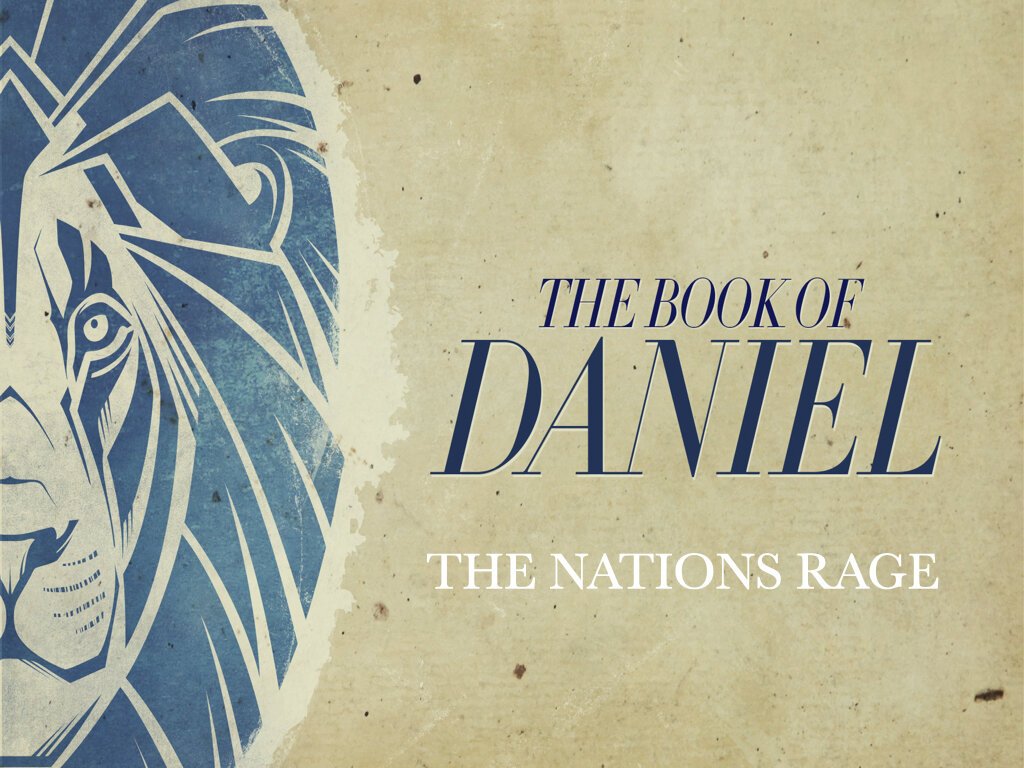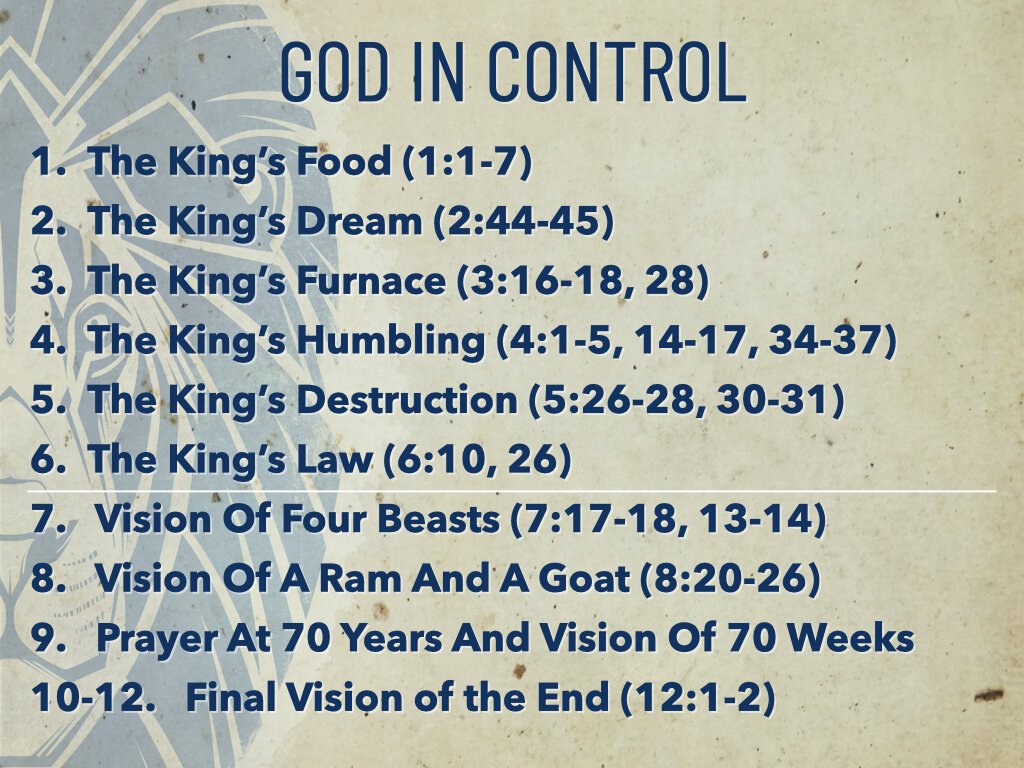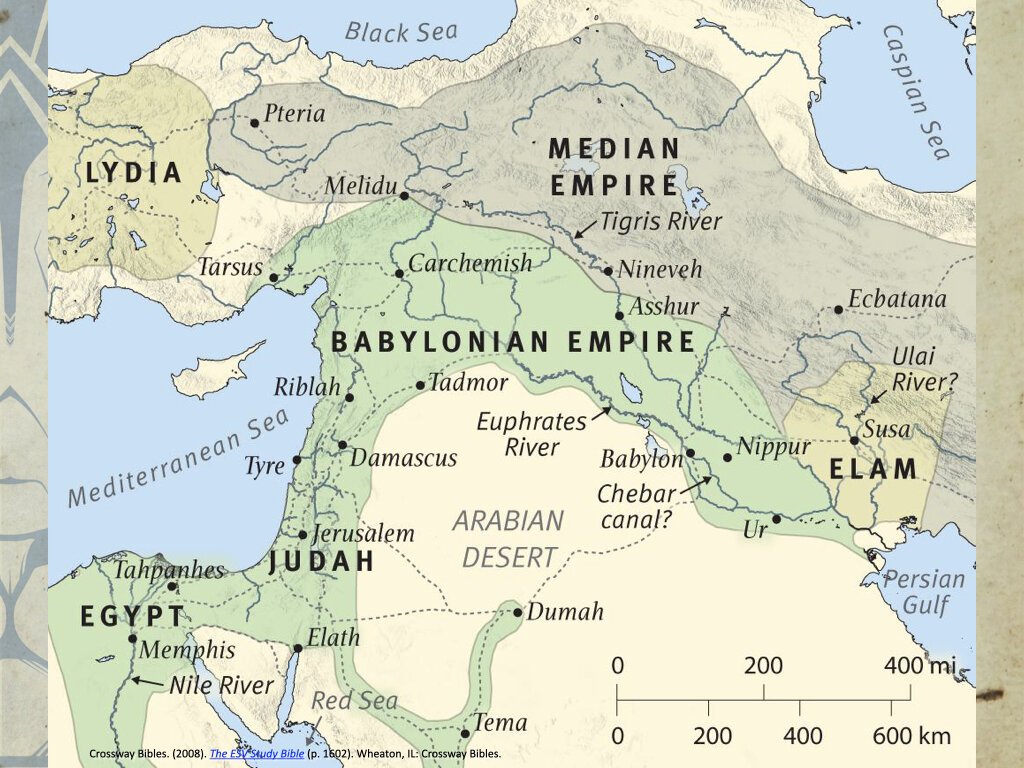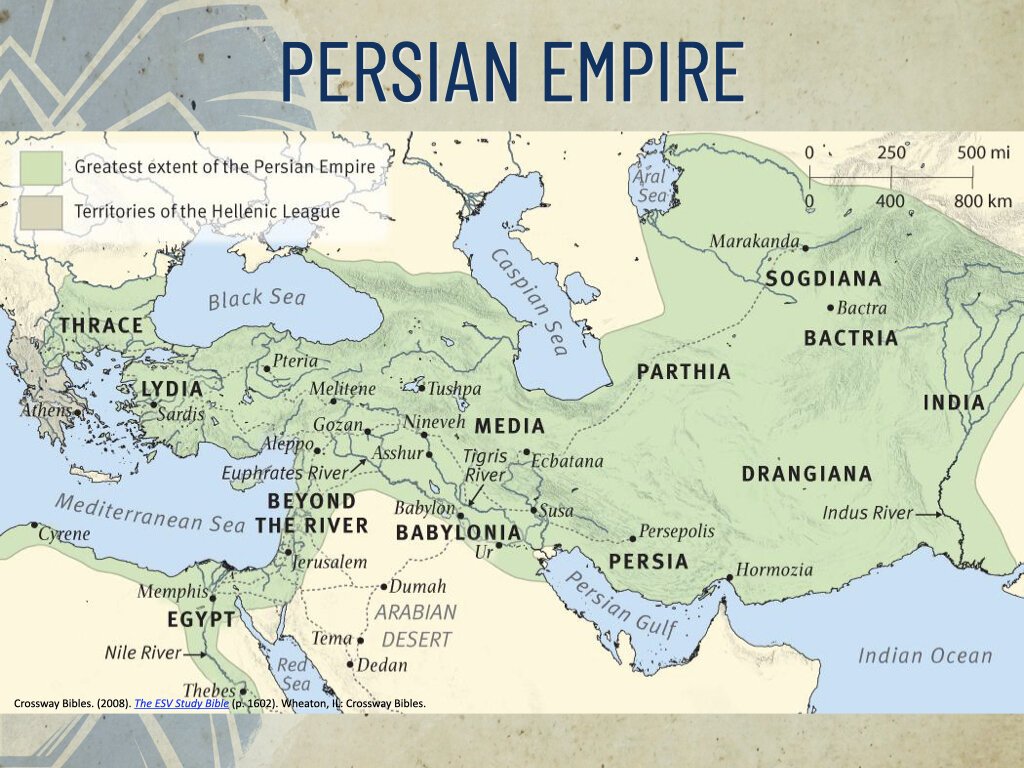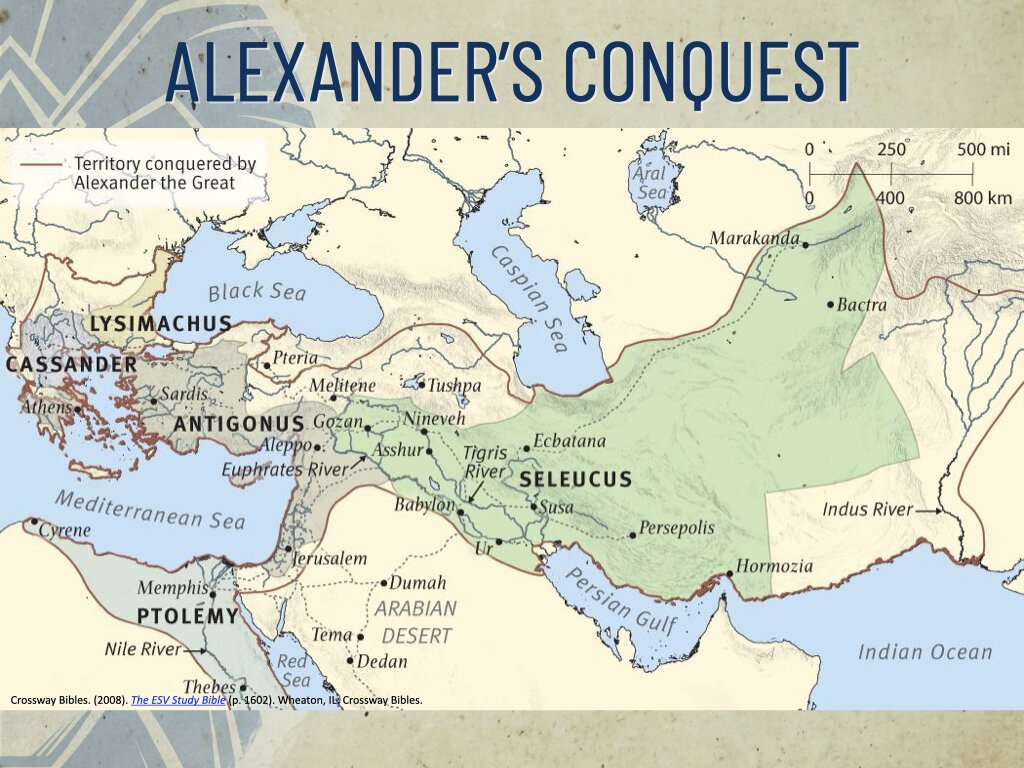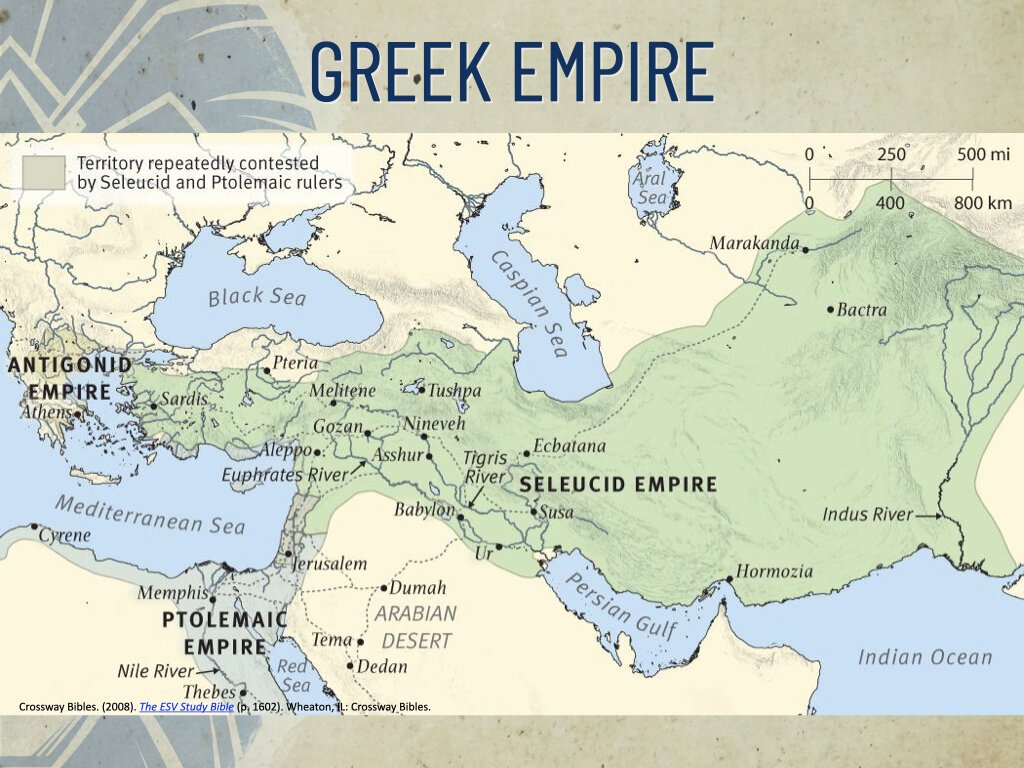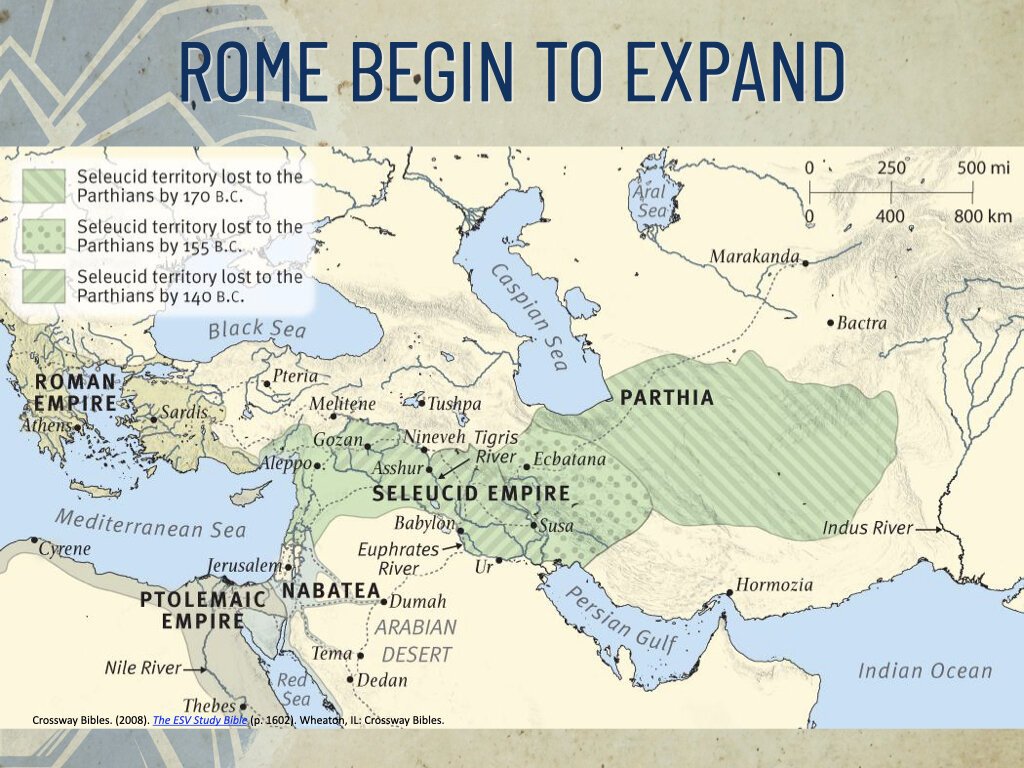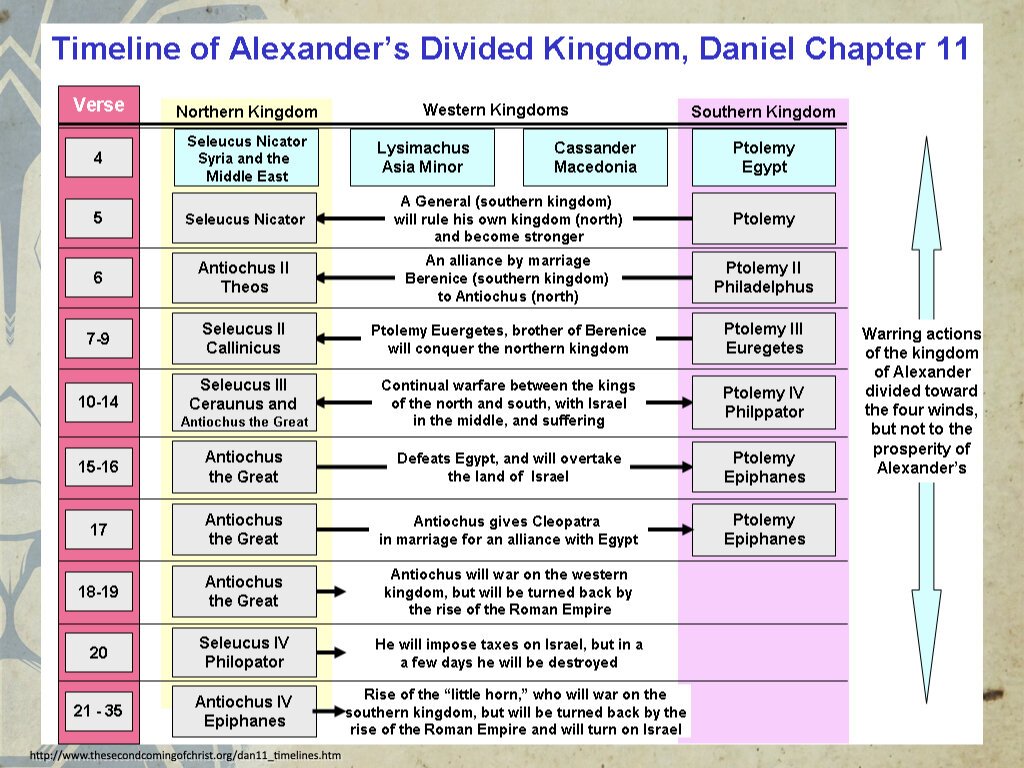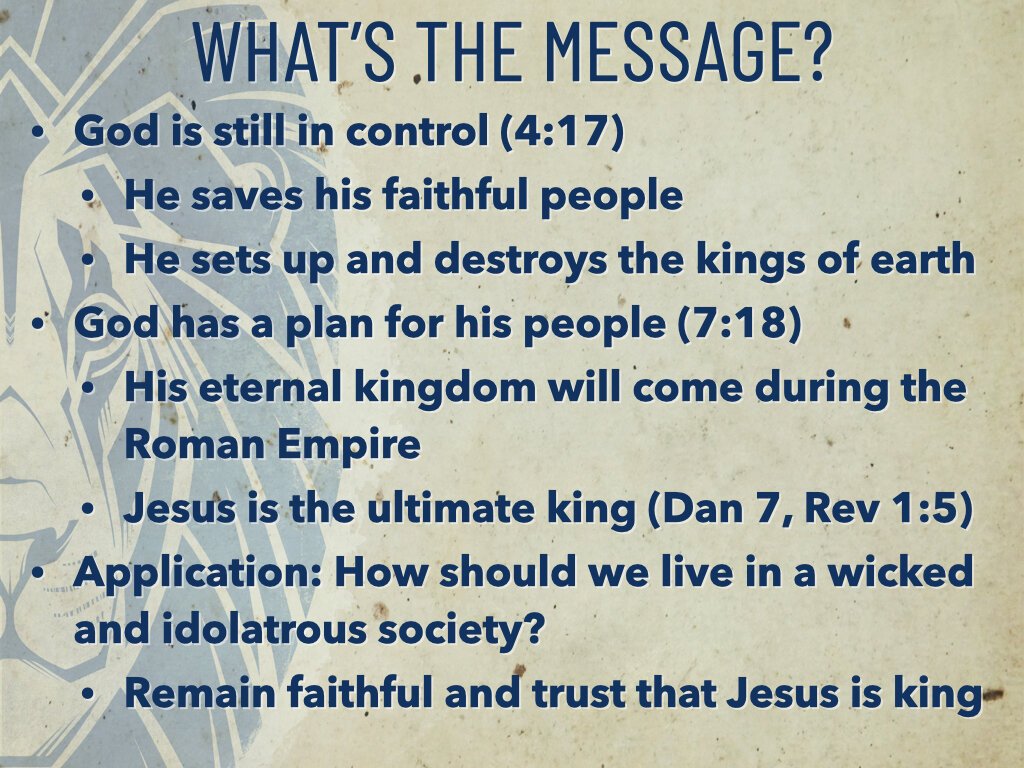The Nations Rage (Daniel)
Daniel was saved for last because it is an essential book to understand what God has planned for the New Testament. It is also the most applicable book for us in the Old Testament. As we go through this book, we could quickly point out parallel situations that match what we might go through daily.
Most of us know what the first half (chapters 1-6) of Daniel is about. It is full of narrative stories that are easy for us to understand and apply. The second half of the book (7-12) is about the visions of Daniel. This section is full of apocalyptic language. This makes most people scared to study it, but we don't need to be afraid. It's a lot like the other prophets we have studied in the past, but it uses symbols to represent nations and kings. If we can understand what the symbols represent, everything will be much easier to interpret.
Narrative
Let's quickly work our way through the book's narrative and see what it's all about. This part will take a considerable amount of time to get each of the six stories' message.
Chapter 1 - The King's Food
Daniel 1:1--7 (ESV) --- 1 In the third year of the reign of Jehoiakim king of Judah, Nebuchadnezzar king of Babylon came to Jerusalem and besieged it. 2 And the Lord gave Jehoiakim king of Judah into his hand, with some of the vessels of the house of God. And he brought them to the land of Shinar, to the house of his god, and placed the vessels in the treasury of his god. 3 Then the king commanded Ashpenaz, his chief eunuch, to bring some of the people of Israel, both of the royal family and of the nobility, 4 youths without blemish, of good appearance and skillful in all wisdom, endowed with knowledge, understanding learning, and competent to stand in the king’s palace, and to teach them the literature and language of the Chaldeans. 5 The king assigned them a daily portion of the food that the king ate, and of the wine that he drank. They were to be educated for three years, and at the end of that time they were to stand before the king. 6 Among these were Daniel, Hananiah, Mishael, and Azariah of the tribe of Judah. 7 And the chief of the eunuchs gave them names: Daniel he called Belteshazzar, Hananiah he called Shadrach, Mishael he called Meshach, and Azariah he called Abednego.
To start, we are introduced to four Jews who were carried off into Babylonian captivity. These young men are from the royal family. They are the cream of the crop. When they get to Babylon, they are put through a three-year training course where they will learn all the Babylonians' ways. The rest of Chapter 1 tells us that they were commanded to eat the same food as the king, but they refuse. They will not be defiled by unclean foods that God has commanded them not to eat. Instead, they ask for vegetables. The one taking care of them is reluctant, so Daniel tells him to test them. If they are not healthier after a certain amount of time by eating vegetables, they will submit to whatever they are commanded to do.
It turns out that the men were stronger and better than everyone else in the training program. These men proved themselves to be ten times wiser than any of the men in Babylon.
Chapter 2 - The King's Dream
In the second chapter, we find out that king Nebuchadnezzar has had an awful dream. He calls for his magicians and sorcerers to tell him the dream as well as its interpretation. But these men cannot read his mind. They have no idea what the king has dreamed of. So Nebuchadnezzar decides to kill them all. When they come to kill Daniel, Hananiah, Mishael, and Azariah, Daniel asks to speak with the king and prays for God's help.
When Daniel comes before the king, he praises the God of heaven and tells the king that God has made known the dream and its interpretation. The king has dreamed about a great statue with a head of gold, chest of silver, midsection, and thighs of bronze, and feet of iron mixed with clay. A rock, cut by no human hand, struck the statue and became a great mountain that filled the earth.
The interpretation of the dream is a foretelling of the kingdoms to come. Babylon, Media/Persia, Greece, and Rome will all make up a grand kingdom, but God will establish his kingdom.
Daniel 2:44--45 (ESV) --- 44 And in the days of those kings the God of heaven will set up a kingdom that shall never be destroyed, nor shall the kingdom be left to another people. It shall break in pieces all these kingdoms and bring them to an end, and it shall stand forever, 45 just as you saw that a stone was cut from a mountain by no human hand, and that it broke in pieces the iron, the bronze, the clay, the silver, and the gold. A great God has made known to the king what shall be after this. The dream is certain, and its interpretation sure.”
After this, Daniel and his friends were given a place of prominence in the kingdom.
Chapter 3 - The King's Furnace
In the third chapter, we learn about the king creating a giant golden statue and commanding everyone to bow down to it. If anyone refuses to bow down, they will be thrown into the fiery furnace. Hananiah, Mishael, and Azariah (Also known as Shadrach, Meshach, and Abednego) refused to bow down. So the king has them come before them and gives them another chance. This is how they respond.
Daniel 3:16--18 (ESV) --- 16 Shadrach, Meshach, and Abednego answered and said to the king, “O Nebuchadnezzar, we have no need to answer you in this matter. 17 If this be so, our God whom we serve is able to deliver us from the burning fiery furnace, and he will deliver us out of your hand, O king. 18 But if not, be it known to you, O king, that we will not serve your gods or worship the golden image that you have set up.”
They refuse to bow down again. So Nebuchadnezzar has the furnace heated up and throws them into the fire. The furnace was so hot that it killed the mighty men who threw them in, but when Nebuchadnezzar looked inside, he saw four men walking around unbound. He commanded them to come out and they didn't even smell like smoke.
Daniel 3:28 (ESV) --- 28 Nebuchadnezzar answered and said, “Blessed be the God of Shadrach, Meshach, and Abednego, who has sent his angel and delivered his servants, who trusted in him, and set aside the king’s command, and yielded up their bodies rather than serve and worship any god except their own God.
Chapter 4 - The King's Humbling
The fourth chapter is unlike any other in all the Bible. Here we have the testimony of a pagan king. Nebuchadnezzar himself writes about what God has shown him.
Daniel 4:1--5 (ESV) --- 1 King Nebuchadnezzar to all peoples, nations, and languages, that dwell in all the earth: Peace be multiplied to you! 2 It has seemed good to me to show the signs and wonders that the Most High God has done for me. 3 How great are his signs, how mighty his wonders! His kingdom is an everlasting kingdom, and his dominion endures from generation to generation. 4 I, Nebuchadnezzar, was at ease in my house and prospering in my palace. 5 I saw a dream that made me afraid. As I lay in bed the fancies and the visions of my head alarmed me.
Do you hear the introduction to this chapter? The king himself is revealing what made him afraid. God gave him a dream about a huge tree that provides for all the beasts of the field and birds of the air. Then a "watcher" calls for it to be cut down. But then, he transitions from talking about a tree to talking about a man.
Daniel 4:14--17 (ESV) --- 14 He proclaimed aloud and said thus: ‘Chop down the tree and lop off its branches, strip off its leaves and scatter its fruit. Let the beasts flee from under it and the birds from its branches. 15 But leave the stump of its roots in the earth, bound with a band of iron and bronze, amid the tender grass of the field. Let him be wet with the dew of heaven. Let his portion be with the beasts in the grass of the earth. 16 Let his mind be changed from a man’s, and let a beast’s mind be given to him; and let seven periods of time pass over him. 17 The sentence is by the decree of the watchers, the decision by the word of the holy ones, to the end that the living may know that the Most High rules the kingdom of men and gives it to whom he will and sets over it the lowliest of men.’
Verse 17 is the key verse of the entire book of Daniel. He wants the world to know that he is in control. Daniel comes in and interprets the dream. He tells the king that he will be cut down like this tree, and a period will pass by until he knows that God is in control.
In verses 28-33, we learn that Nebuchadnezzar became proud about a year after this dream. Then, he went crazy and started eating grass like a mad man until he knew that God was in control. Afterward, he returned to his throne and proclaimed God's greatness.
Daniel 4:34--37 (ESV) --- 34 At the end of the days I, Nebuchadnezzar, lifted my eyes to heaven, and my reason returned to me, and I blessed the Most High, and praised and honored him who lives forever, for his dominion is an everlasting dominion, and his kingdom endures from generation to generation; 35 all the inhabitants of the earth are accounted as nothing, and he does according to his will among the host of heaven and among the inhabitants of the earth; and none can stay his hand or say to him, “What have you done?” 36 At the same time my reason returned to me, and for the glory of my kingdom, my majesty and splendor returned to me. My counselors and my lords sought me, and I was established in my kingdom, and still more greatness was added to me. 37 Now I, Nebuchadnezzar, praise and extol and honor the King of heaven, for all his works are right and his ways are just; and those who walk in pride he is able to humble.
Chapter 5 - The King's Destruction
In Chapter 5, we learn about Belshazzar. He was the grandson of Nebuchadnezzar. He decided to throw a big party and break out the cups from the Temple at Jerusalem. He worshipped the gods of gold and silver. But God sent a hand to write on the wall, "MENE MENE TEKEL PARSIN." Belshazzar was terrified at the sight and went everywhere trying to find out what it meant.
His queen mother told him to seek out Daniel and ask him. Daniel reminded him of the humbling of Nebuchadnezzar. He says, "You knew that the God of Judah did this to your father, but you lifted yourself against him anyway." The writing means, "God has numbered your days. God has weighed you in the balances and you have been found wanting. He will divide your kingdom and give it to the Medes and Persians."
Daniel 5:30--31 (ESV) --- 30 That very night Belshazzar the Chaldean king was killed. 31 And Darius the Mede received the kingdom, being about sixty-two years old.
Chapter 6 - The King's Law
Chapter 6 is a lot like Chapter 3. Darius seems like a pretty good king, but he is deceived into making a law where everyone must only pray to him. They are not allowed to worship any other god but him for thirty days. Daniel gets caught rebelling against the king. He continues to pray to God even though the king's law states that he will be thrown into a lion's den if he prays to God.
Darius reluctantly throws him into the lion's den, then he prays and fasts for God to save Daniel. God does save Daniel, and Darius throws the wise men who were trying to destroy Daniel into the den. They are crushed instantly.
The chapter's focus is on Daniel's devotion to seeking God even when the laws of men command him to stop. He wasn't breaking a commandment by not praying or by being more secretive. But he knew that a relationship with the Lord was more important than life itself.
Apocalyptic Section
This brings us to the book's apocalyptic section, but really, we have already received a taste of apocalyptic literature. Nebuchadnezzar's dream about a statue and a tree are apocalyptic. They discuss the future using symbols. In this section, we will learn about the dreams of Daniel.
Chapter 7 - God's Plan
The first vision is of a great sea. Can you imagine a sea? Out of the sea, four beasts arise. Each beast has different characteristics. The first looks like a lion but stands up to walk like a man. The second looks like a bear, but it only gets lifted on one side. The third looks like a leopard and the fourth beast is like a machine with iron teeth. The fourth is more gruesome than the rest. It is full of destruction, and it has ten horns with a little horn that plucks up three horns. It also has a mouth that speaks great things. These are probably boastful words about itself.
Do you see the images? Doesn't that sound a lot like the four sections of the statue? What about the rock that comes in a destroys the statue? In verses 9-14, we learn about God sitting on his throne and destroying the fourth beast. Then, he sets up one like the Son of man to sit on a throne and have dominion over all the earth.
What is this vision about?
Daniel 7:17 (ESV) --- 17 ‘These four great beasts are four kings who shall arise out of the earth.
In verse 19, we read that Daniel wants to know more about the fourth beast. Verses 23-25 tell us that the fourth kingdom will devour the whole earth, speak against God, and wear out the saints. Then, God will destroy it and give the kingdom to his people forever.
Daniel 7:27--28 (ESV) --- 27 And the kingdom and the dominion and the greatness of the kingdoms under the whole heaven shall be given to the people of the saints of the Most High; his kingdom shall be an everlasting kingdom, and all dominions shall serve and obey him.’ 28 “Here is the end of the matter. As for me, Daniel, my thoughts greatly alarmed me, and my color changed, but I kept the matter in my heart.”
Chapter 8 - Israel Will Suffer Again
In Chapter 8, Daniel was given another dream two years later about a ram and a goat. With its big horn, the goat destroys the ram, and then it turns against God's people to destroy their worship and their sanctuary. God tells Daniel precisely what will happen in the future through this dream. Listen to the interpretation.
Daniel 8:20--21 (ESV) --- 20 As for the ram that you saw with the two horns, these are the kings of Media and Persia. 21 And the goat is the king of Greece. And the great horn between his eyes is the first king.
This vision is primarily about what will happen after Alexander the Great establishes the Greek kingdom. A ruler named Antiochus IV will cause the Jews to suffer many things before God destroys him.
Chapter 9 - Daniel's Prayer/God's Timeline
Chapter 9 is primarily about Daniel praying for the people to return to Jerusalem. God promised through Jeremiah that they would be exiles for 70 years, then Cyrus would allow them to return. Daniel prays for God to do that, but not because the people deserve it. He calls for God to do that because God is great in mercy and compassion. The chapter ends with another vision. This is called the seventy-week vision, and it restates God's plan to fulfill his promises and bring his people back before destroying them again.
Chapter 10-12 - The End
The last three chapters make up the final vision of Daniel. This is by far the most elaborate vision because it gives us a detailed explanation of what will happen in the future. Daniel spends three weeks fasting and praying for God to reveal what will happen in the future to him in greater detail. So God sends him an angel to tell him everything (10). In Chapter 11, he tells him about the kings of Persia and Greece. In this section of scripture, knowledge of history will blow your mind. God gives such details about what will happen in the affairs of kings and queens that men have concluded, "This must be written after the events took place."
In verses 21-45, God describes Antiochus IV in great detail to let Daniel know what will happen to the Jews during his days. But verses 36-45 are odd. They almost seem like they describe a Roman leader more accurately than Antiochus, but no transition is made in the text. Consequently, these are the most heavily debated verses in the book. I try not to pick a side if both sides make valid arguments. However, the attention to detail leading up to this section and the lack of transition make it unlikely that God jumps forward to Jerusalem's Roman destruction. God is telling us what Antiochus will be like, and Antiochus represents what will happen again during the Roman emperors' reign.
Antiochus sets up the abomination that makes desolate. He slaughters a pig in the temple, replaces the high priest, and completely changes their religion. After Antiochus brings about this abomination, the Maccabean revolt takes place. Then, the Romans take over. Over a hundred years after Antiochus dies, we get to Jesus, who quotes Daniel's prophesy, foretelling another abomination that makes desolate.
Matthew 24:15--16 (ESV) --- 15 “So when you see the abomination of desolation spoken of by the prophet Daniel, standing in the holy place (let the reader understand), 16 then let those who are in Judea flee to the mountains.
The phrase that is repeated continuously throughout this section of Daniel is, "The end." That has led many people to assume that this part of the book is about the end of time, but it is more likely to refer to the end of the third kingdom or the end of the nation and beginning of God's kingdom (As the visions all foretell). That is what Daniel is most concerned about. That is why he has fasted for three weeks. Previous visions seem to indicate that his people will be in great trouble during the reign of the fourth beast. God reveals to him what the third beast will look like, which is a hint of the fourth beast.
Daniel 12:1--4 (ESV) --- 1 “At that time shall arise Michael, the great prince who has charge of your people. And there shall be a time of trouble, such as never has been since there was a nation till that time. But at that time your people shall be delivered, everyone whose name shall be found written in the book. 2 And many of those who sleep in the dust of the earth shall awake, some to everlasting life, and some to shame and everlasting contempt. 3 And those who are wise shall shine like the brightness of the sky above; and those who turn many to righteousness, like the stars forever and ever. 4 But you, Daniel, shut up the words and seal the book, until the time of the end. Many shall run to and fro, and knowledge shall increase.”
In the final chapter, he tells Daniel about a time of greater trouble, but he says that Daniel's people will be delivered and receive everlasting life.
What's The Message?
The message of Daniel is primarily to the exiles. They need to hear that God is still in control. The kings of earth seem all-powerful, but God can bring them to their knees. He rules over the kingdoms of men and sets up the lowliest of men to rule. The proud kings of the earth will fall. The exiles must not put their trust in men or let them turn their hearts away from God.
This book has three major characters: God, his faithful people, and the earth's kings. God is working behind the scenes throughout most of the book, but his presence is unmistakable. Daniel and his friends represent the faithful. They show us that it is possible to trust in God while being surrounded by a culture and society that is completely opposed to God. Their lives train us to trust in God even when it doesn't seem like he could help us. God comes through and shows us that he can deliver from the direst circumstances. The kings of this earth are a perfect portrayal of men and women in power. They ignore God and glorify themselves. But pride and arrogance lead to their destruction.
Daniel is a book full of stories and visions, but what are they all about? What is God trying to tell us in this book? The visions all point to a future kingdom that God will set up. It will be over all the kingdoms of the earth, he will have his king ruling over it, and it will come during the fourth kingdom (Rome). All of the visions point to this reality. The New Testament also reveals this taking place with Jesus ascending to the throne with all rule and power. Revelation portrays Jesus as the Son of man with all rule and authority repeatedly.
Revelation 1:4--5 (ESV) --- 4 John to the seven churches that are in Asia: Grace to you and peace from him who is and who was and who is to come, and from the seven spirits who are before his throne, 5 and from Jesus Christ the faithful witness, the firstborn of the dead, and the ruler of kings on earth. To him who loves us and has freed us from our sins by his blood
Application
Can you imagine living in a foreign land with an overly oppressive government that expects us to worship idols and engage in the same religious practices as everyone else? The main application is that our time in America should resemble Daniel's time in Babylon. How should we live in a wicked and idolatrous nation? Should we give in to the norms of society? Should we disrespect the authorities over us and rebel? That's not the way of God's faithful people. They respected their earthly king, but ultimately they recognize that God is over all. They accepted that men might punish them for being faithful to God, but they also believed that God could work in that suffering to refine us and exalt us.
We must learn to trust that God still rules in the kingdoms of men through Jesus, our king. He brings down the proud and exalts the lowly. If the law pushes me away from God, I push back. We have to love God more than our lives.

